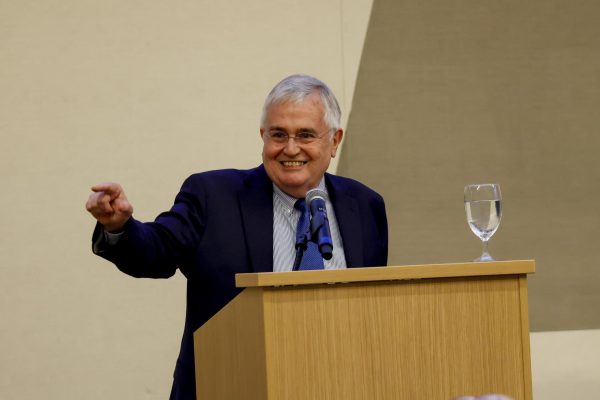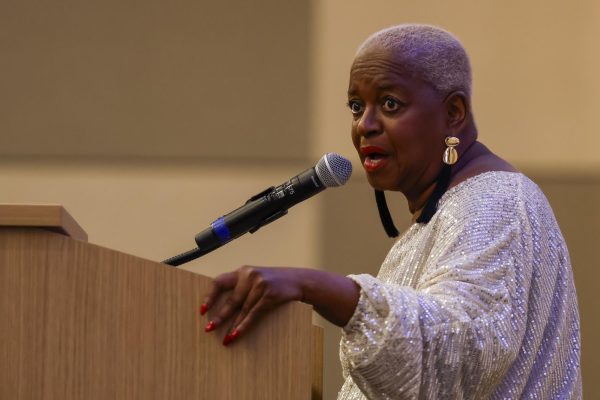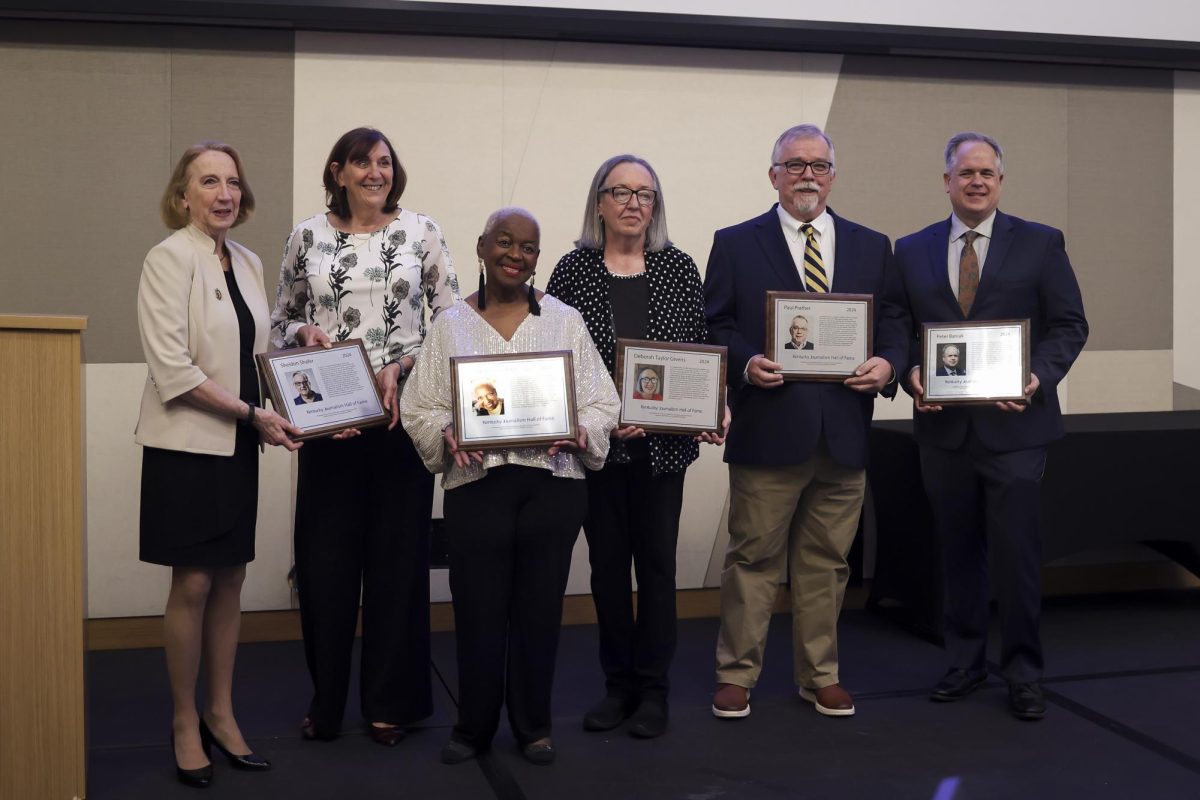Retired University of Kentucky professor Elizabeth “Scoobie” Ryan was among one of seven honorees at this year’s Kentucky Journalism Hall of Fame induction ceremony hosted by the UK Journalism Alumni Association.
Those inducted into the Kentucky Journalism Hall of Fame on April 9 include Peter Baniak, Betty Winston Bayé, Deborah Taylor Givens, Rev. Paul Prather, Ryan, the late Sheldon Shafer and the late Kyle Vance.
The Hall of Fame contains over 200 individuals, according to Duane Bonifer, president of the UK Journalism Alumni Association.
“The Hall, which opened in 1981, honors achieving journalists who are natives of Kentucky or have spent most of their careers working for Kentucky media organizations,” Bonifer said.
Only four of this year’s seven inductees were in attendance, missing Ryan, Sheldon Shafer — a longtime Courier Journal reporter who died on Monday, April 8 — and Kyle Vance, who died in 1980.
“The hall recognizes journalists both with and without formal ties to the University of Kentucky who practice the craft of journalism and made it a true art by helping the rest of us find a deeper, richer meaning to life,” Bonifer said.
Before the ceremony, Al Cross, “a political writer, and some would say the most feared man in Kentucky,” according to Acting Vice Provost Jennifer Greer, gave the Joe Creason Lecture on Journalism. Cross worked for 26 years at the Courier-Journal as a reporter (and 15 and a half as its chief political writer), according to the pamphlet at the ceremony.
The lecture is named after Joe Creason, a journalist for the Courier-Journal who “traveled all 120 counties in the commonwealth and wrote stories of people,” according to Greer.
“This event has run in conjunction with the Kentucky Journalism Hall of Fame on and off over the past 20-plus years,” Greer said. “The fact that Al Cross is giving the Joe Creason Lecture in Journalism closes a circle going back more than 50 years when Joe Creason was writing for the Courier-Journal … Al’s father, Perry Cross of Albany, was one of Joe’s many sources.”
Cross is often quoted nationally in regard to Kentucky politics, according to Greer, and is also a member of the Kentucky Journalism Hall of Fame.
“Journalism is in trouble. Mainly because the news business is in trouble. I think too many of us forget that journalism and the news business are not the same thing,” Cross said.

Cross says that every American has the First Amendment right to “commit Journalism” and that it’s an instructive verb.
“With that right comes the need to exercise it responsibly,” he said. “Those of us in Journalism have been disappointed to learn that Americans don’t like news as much as we thought they did.”
Cross pointed out that newspapers today penetrate less than 10% of average households.
“Truth be told, Americans would rather be entertained than informed,” he said. “Those two things are in competition for American’s limited time.”
When signing off on emails regarding Kentucky, Cross uses a quote from James Madison that questions popular government without popular information and whether or not it’s a farce, a tragedy or both.
“Today, we are losing that, as Americans pick and choose among sources of information, some of them masquerading as journalism that fit their view of the world. They may say they’re looking for information, but many of them just want confirmation of the views they have, rather than information that might run contrary to those views,” he said.
Cross encouraged those in attendance to continue to fight “bad journalism” that is resulting in a decline in the quality and quantity of journalism.
“Those of us who care about journalism need to do more to remind our friends and neighbors of the differences in social media and news media,” he said. “Too many news outlets are giving their audiences what they want instead of what they need.”
Before concluding his speech, Cross expressed his hope that everyone in the room leaves with a greater concern about the future of journalism and democracy.
“Once we view constitutionally protected news organizations, like any other widget, in a capitalist economy, our democracy is doomed,” Cross said. “This lecture about journalism is really about something more important: democracy.”
Elizabeth “Scoobie” Ryan, from New Jersey, taught at UK from 1996-2023. She was associate director of UK’s School of Journalism and Media from 2010 to 2019, interim director from 2019 to 2020 and a recipient of UK’s James Madison Award for Service to the First Amendment.
“She was a strong advocate for high school journalism, and an everlasting resource for UK students and alumni,” Bonifer said.
Al Cross accepted the award on Ryan’s behalf.
“She was the heart and soul of the School of Journalism,” Cross said. “I don’t know of any faculty member who’s has such long lasting relationships with students, which is a great testimony to what she did.”
Betty Winston Bayé was also inducted into the Hall of Fame. Bayé is a journalist who “broke racial barriers at the Courier-Journal,” according to Bonifer.
Bayé is from New York, with a bachelor’s degree from Hunter College and a master’s in Journalism from Columbia University.
“I came into journalism out of the theater and the Civil Rights movement and probably for all the wrong reasons,” she said. “I wanted to tell the stories of my people. I wanted to write a love letter to people who had been so badly treated.”
Bayé also participated in the Nieman Fellowship at Harvard University in 1990, a research opportunity that Harvard offers, bringing in journalists to Harvard from over 100 countries to study for a year.
“I wasn’t always well-liked. And it was sometimes very dangerous for me. I got threats,” she said. “There were all kinds of things. And I think even my colleagues laughed at me when I went to my first Kentucky Derby and I was gonna cover Millionaire’s Row and I put on my best linen white shirt and black pants, and they said ‘They’re gonna mistake you for a waitress.’”

Bayé recalled a time when she interviewed Rosemary Clooney and a man came up to her and dug his fingers into her back, saying they needed more drinks at table 42.
“I remember Rosemary Clooney whipped around and said ‘She’s not a service person. She’s a journalist,’” she said.
She also recalled a time when there was a man, whose identity still remains a mystery, who would send her letters from different addresses, threatening her and sending hate-mail. Sometimes her coworkers wouldn’t show her the letters due to their words.
“I always took seriously my responsibility as a journalist. Some days it was so hard, and I think everybody didn’t know, some days I’d sit in my office and cry because people called me names,” she said. “I wasn’t protected.”
Bayé also recalled a time when she worked with one of her fellow inductees this year, the late Sheldon Shafer, an Indiana native, yet “a fixture of Louisville and perhaps its most prolific reporter,” Bonifer said.
“I am overjoyed about being in a hall of fame, but I’m so sad that Sheldon is not here,” she said. “Sheldon and I shared my first computer. We had a dolly and we would roll it around, Sheldon would write on one side and I’d be on the other side.”
Bonifer first introduced California-born Peter Baniak, who “became known in the Kentucky news business for delivering high-quality journalism in an era of shrinking resources,” according to Bonifer.
Baniak was an intern for the Lexington Herald-Leader while also a student at Northwestern University, where he earned his bachelor’s and master’s degrees. He had a residency at the Chicago Tribune.
Baniak recalled the time when he first started working at the Folsom Telegraph, where he trimmed weeds in the parking lot, delivered papers and composed pages with XACT-O blades, slowly moving on to write stories.
“He was hooked. And then he persuaded his parents to let him go to journalism school in Chicago, even though they knew that his primary interest in doing so was to go to as many Cubs games at Wrigley Field as possible,” Baniak said regarding his story of how he started his journalism career.
Baniak had never been to Kentucky before his internship at the Herald-Leader. Before visiting, he had just finished reading Harry Caudill’s “Night Comes to the Cumberlands.”
“Which led me to conclude that this was a place of rich stories and a place that needed a steady supply of journalism with a capital J,” he said.
Baniak was also editor and general manager at the Herald-Leader from 2009-2023, having worked for the paper for 28 years total.
“Being editor of the Herald-Leader for nearly 15 years was the honor of my life. A lot has been said in recent years about the gloom and doom facing local journalism,” Baniak said. “I take a more optimistic view. Even after the upheaval in the last decade, I take heart in journalism’s future because of journalists.”
The late Sheldon Shafer was also inducted this year. Two of his longtime coworkers, Deborah Yetter and Jean Porter, accepted his plaque for him, giving a speech about the fond memories they have of him.
“He knew he was about to receive this award and was deeply grateful. It was the final honor he had hoped to achieve and has more than four decades in Journalism with the Courier-Journal,” Yetter said. “He asked that we express his gratitude when he realized his worsening health would not allow him to attend the ceremony.”
Shafer retired in 2017, with what he estimated to be 25,000 bylines at the Courier-Journal.
“‘Give me a quote, big guy,’ he would actually tell people, then he’d go to work calling one contact after another,” Yetter said. “‘Thanks, I love you, big guy,’ was how Sheldon would typically end interviews.”
At the end of their speech, Yetter and Porter said goodbye to Shafer together.
“We love you, big guy,” they said in unison.

































































































































































